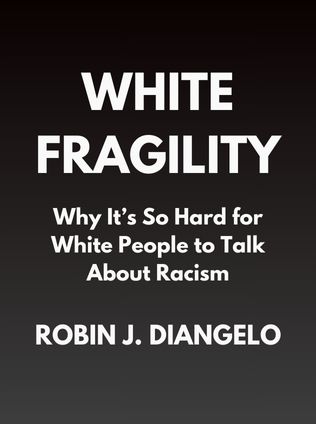
White Fragility
Why It’s So Hard for White People to Talk About Racism
By Robin J. DiAngelo
Published 06/2018
About the Author
Robin DiAngelo, an accomplished author and anti-racist educator, has dedicated her career to exploring the dynamics of race and white supremacy in the United States. With a background in sociology and years of experience in diversity training, DiAngelo has become a leading voice in discussions on racism, particularly focusing on the concept of "white fragility." Her work is deeply influenced by her own experiences as a white woman and her observations of how white people, even those who consider themselves progressive, react when confronted with issues of race. DiAngelo's goal is to encourage white people to confront their own complicity in systemic racism and to engage in the difficult, uncomfortable work of anti-racism.
Main Idea
In her seminal work, White Fragility: Why It’s So Hard for White People to Talk About Racism, Robin DiAngelo delves into the psychological and social mechanisms that make it difficult for white people to confront and discuss racism. The main idea of the book is that white people, particularly those who see themselves as non-racist or progressive, often experience intense defensiveness, anger, or guilt when the topic of racism is brought up. This reaction, which DiAngelo terms "white fragility," serves to protect the status quo of racial inequality by preventing meaningful dialogue and reflection. The book challenges readers to understand that racism is not just about individual acts of meanness or prejudice, but about a system of power and privilege that benefits white people, whether they are conscious of it or not.
Table of Contents
- Introduction
- Misdefining Racism
- The Myth of Individualism
- No One Is Objective
- The Origins of Race
- Colorblindness: Denying Race, Denying Racism
- Race Talk
- Racist Jokes and White Solidarity
- White Denial
- The Pervasiveness of Institutional Racism
- White Excuses
- White Comfort
- A Mechanism of Control
- Confronting White Fragility
Introduction
The concept of white fragility emerges from the recognition that race and racism are deeply embedded in the fabric of American society. DiAngelo opens her book by addressing the discomfort that white people often feel when discussing race. This discomfort is not merely a personal issue but is reflective of broader societal patterns. White fragility, according to DiAngelo, is a defensive response that white people exhibit when their racial worldview is challenged. This response is characterized by feelings of anger, fear, and guilt, which serve to maintain racial hierarchies by avoiding deeper engagement with the realities of racism.
DiAngelo emphasizes that white fragility is not an accusation but a lens through which to understand how deeply ingrained racism is in society. It is a call to white people to acknowledge their own participation in a system that privileges them at the expense of others. The introduction sets the tone for the rest of the book, inviting readers to move beyond their initial discomfort and to engage with the material in a meaningful way.
Misdefining Racism
One of the key points DiAngelo makes in her book is that white people often misdefine racism. Traditionally, many white people view racism as a series of isolated acts committed by "bad" individuals, rather than as a systemic issue. This narrow definition allows white people to distance themselves from racism, believing that as long as they don't commit overtly racist acts, they are not part of the problem. However, DiAngelo argues that this view is not only incorrect but also dangerous.
“Racism is not about individual acts of meanness; it is about the power and privilege that are systematically granted to white people.” — Robin DiAngelo
Racism, as DiAngelo defines it, is about power. It is a system in which the default norms, standards, and values are established by white people, for white people. This system perpetuates inequality by maintaining white dominance in every major societal institution, from the economy to the legal system to education. By misdefining racism, white people can comfortably ignore their own complicity in this system.
The Myth of Individualism
Another significant idea explored in White Fragility is the myth of individualism. In American culture, individualism is a deeply ingrained belief that people are responsible for their own success and that everyone has an equal opportunity to achieve their goals. This belief, however, ignores the reality of systemic barriers that disproportionately affect people of color.
DiAngelo points out that individualism serves as a convenient justification for the status quo. It allows white people to attribute their success solely to their own efforts, without acknowledging the unearned advantages they receive due to their race. This belief in individualism also makes it difficult for white people to see how their actions and attitudes contribute to the perpetuation of racism.
“The belief in individualism leads white people to see themselves as unique, unshaped by history, socialization, or their position in the racial hierarchy.” — Robin DiAngelo
By challenging the myth of individualism, DiAngelo encourages readers to see themselves as part of a larger social system. She argues that true change can only happen when white people acknowledge the ways in which they benefit from and uphold systemic racism.
Sign up for FREE and get access to 1,400+ books summaries.
You May Also Like
The Subtle Art of Not Giving a F*ck
A Counterintuitive Approach to Living a Good Life
By Mark MansonHow To Win Friends and Influence People
The All-Time Classic Manual Of People Skills
By Dale CarnegieFreakonomics
A Rogue Economist Explores the Hidden Side of Everything
By Steven D. Levitt and Stephen J. DubnerI Am Malala
The Story of the Girl Who Stood Up for Education and Was Shot by the Taliban
By Malala Yousafzai



















